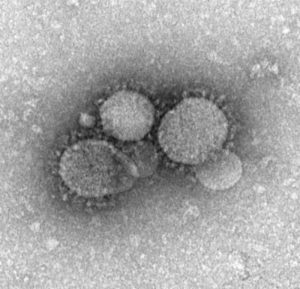Just days after Illinois health officials reported that there was no spread from the first Middle East Respiratory Syndrome coronavirus (MERS-CoV) case in Indiana, the Centers for Disease Control and Prevention (CDC) reported today evidence of apparent past MERS-CoV infection in an Illinois man who had close contact with the Indiana MERS patient.

The CDC says, “For the Illinois resident, laboratory test results showing apparent past MERS-CoV infection were reported late night on May 16. CDC officials explained that these laboratory test results are preliminary and suggest that the Illinois resident probably got the virus from the Indiana patient and the person’s body developed antibodies to fight the virus.
“There are two main ways to determine if a person is or has been infected with MERS-CoV. We can collect a respiratory sample and use a test called PCR to determine if a person has active infection with the virus. Or we can do a blood test that looks for antibodies to MERS-CoV that would indicate a person had previously been infected with MERS-CoV.”
The Illinois resident has no recent history of travel outside the United States. He met with the Indiana patient on two occasions shortly before the patient was identified as having MERS-CoV infection. As part of the MERS follow-up investigation, the local health department in Illinois contacted the Illinois resident on May 3. The health department first tested this person for active MERS-CoV infection on May 5. Those test results were negative. Public health officials are collecting blood samples from people who were identified as close contacts of the Indiana patient. On May 16, the test result was positive for the Illinois resident, showing that he has antibodies to MERS-CoV.
The Illinois resident did not seek or require medical care. However, local health officials have monitored his health daily since May 3 as part of the investigation. At this time, the Illinois resident is reported to be feeling well. For more infectious disease news and information, visit and “like” the Infectious Disease News Facebook page.
“This latest development does not change CDC’s current recommendations to prevent the spread of MERS,” said David Swerdlow, M.D., who is leading CDC’s MERS-CoV response. “It’s possible that as the investigation continues others may also test positive for MERS-CoV infection but not get sick. Along with state and local health experts, CDC will investigate those initial cases and if new information is learned that requires us to change our prevention recommendations, we can do so.”
There has been two confirmed imported cases in the United States to date, the first in Indiana on May 2, and the second in Florida on May 11.

